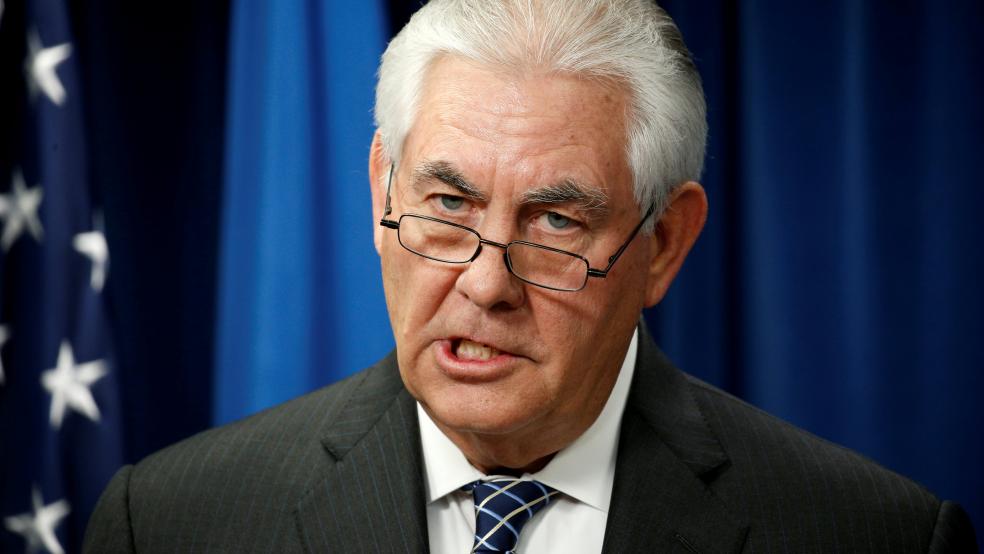Later this month, Secretary of State Rex Tillerson is scheduled to host a high-profile meeting in Washington with representatives of 68 nations involved in the U.S.-led coalition to fight the Islamic State.
The conclave will be Tillerson’s first big moment at center stage as America’s top diplomat, but it remains to be seen whether the meeting on Mar. 22 can put to rest the sense that the former ExxonMobil CEO has been sidelined as a major player in U.S. foreign policy.
Related: 'CEO' Tillerson Faces Internal Skeptics, Crisis-Battling White House
In mid-February, Tillerson did attend a gathering of G20 foreign ministers in Germany, but he largely avoided the press and didn’t make much of a splash. And there has been a steady stream of stories suggesting that after only a couple of months on the job, the secretary has been cut out of the decision-making process, with foreign policy being run by a close cadre of Trump advisers led by White House Chief Strategist Steve Bannon and Trump son-in-law Jared Kushner.
That line of thinking is not without supporting evidence.
Tillerson was all set to hire Elliot Abrams, a foreign policy veteran who had served under Presidents Ronald Reagan and George W. Bush, but the appointment was nixed by President Trump. In a piece last May in the conservative Weekly Standard, Abrams had written: "The party has nominated someone who cannot win and should not be president of the United States."
That apparently did not sit well with the man who did win and did become the Commander-in-Chief. Abrams was also one of the neo-cons who pushed for the invasion of Iraq, which Trump railed against during the campaign. So Tillerson still does not have a No. 2.
Related: 10 Things to Know About Rex Tillerson, Trump’s Choice for Secretary of State
Tillerson and officials at Foggy Bottom were also not consulted before Trump issued his first so-called travel ban — which had to be pulled and retooled in the face of fierce opposition and negative judicial decisions — and the secretary of state was out of the loop when the decision was made to mount a special-ops raid in Yemen in which a Navy Seal was killed along with 25 civilians, including nine children.
When Trump conferred with Israeli Prime Minister Benjamin Netanyahu on Feb. 15, Tillerson was flying to Germany, but his designated representative was shut out of the meeting. Tillerson also didn’t take part in meetings with Canadian Prime Minister Justin Trudeau.
And the State Department is bracing for a significant reduction in budget and staff — one that Tillerson fundamentally supports, according to Bloomberg.
On Thursday, according to New York magazine, the State Dept. was unaware that Mexican Foreign Minister Luis Videgaray was in Washington meeting with Kushner, National Security Adviser H.R. McMaster and economic adviser Gary Cohn.
In February, Eliot Cohen, the academic and adviser to former Secretary of State Condoleezza Rice, wrote in The Atlantic: If Kushner “becomes foreign governments’ chief conduit into the administration, it undermines the bureaucracies and—because one may doubt that he is surrounded by State Department notetakers—opens the way for more miscommunication and failed coordination. There is a good reason for those pesky protocols and routines, and for the discipline of good order. Maybe a Nixon and a Kissinger could run foreign policy cutting everyone else out, but Trump is no Nixon, and there is no Kissinger in the offing.”
Related: Trump’s Surprisingly Strong Defense and Foreign Policy Team
There have been multiple reports about a demoralized State Department, and on Thursday, Micah Zenko, a senior fellow at the Council on Foreign Relations, tweeted:
Gave book talk today to an unusually large audience at State Dept. After, a SES person told me, "We've literally nothing else to do."
— Micah Zenko (@MicahZenko) March 9, 2017
It may be too early to count out the press-shy Tillerson, who thus far has kept his head down and reportedly nurtured the same methodical approach to learning his new job that served him well as a CEO. But reports suggest that the new secretary of state may not seek to pursue a grand vision for U.S. diplomacy and global influence. “Instead,” the Bloomberg report said, “he sees himself as a manager with an eye toward corporate-style reform, an outgrowth of his four decades in the private sector, according to those familiar with his thinking.”
One scenario that Cohen, now director of Strategic Studies at the Johns Hopkins School of Advanced International Studies, laid out (and rejected) is that “Trump, overwhelmed by a leadership task far beyond his experience and personality, will focus his efforts on infrastructure projects and the like and quietly concede the direction of foreign policy to his sober secretaries of state and defense….”
That could still happen, and Tillerson could finally take charge. Yet sometimes if you’re playing a long game, you can take too long.





